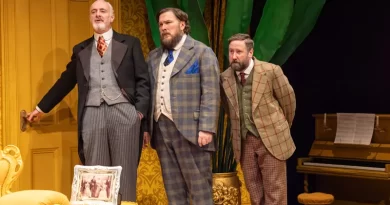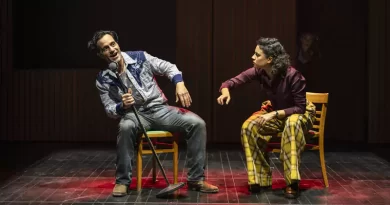“Otherland” at Almeida Theatre
Simon Jenner in North London
22 February 2025
“It doesn’t mean all women, okay.” Between a joyous wedding and breaking up the CD collection, a stray memory troubles Harry. She’s transitioning, but her partner Jo, who’s preferred women apart from Harry, doesn’t think this helps. Chris Bush’s Otherland opens at the Almeida Theatre till 15 March directed by Ann Yee.

Photo credit: Marc Brenner.
At a time when trans women have their passports withdrawn in the States, and contemplate desperate flight before lynch mobs turn up, while encounter hostility here in the UK, this is a story we need. And not just once. In its two-hours-forty-five traversal, Bush has pioneered the first mainstream work around (not of) transitioning; others must follow.
In crafting this aching drama of a couple who both undergo physical transformation, Standing at the Sky’s Edge writer Bush doesn’t flinch from both the otherness of change or the othering world. Nor indeed the eponymous Otherland you might find at the other side of an ocean. If you’re allowed to climb out of it. Act Two brings surprises.
Till then details of micro-othering inform even the most intimate relationships. Jo’s “Ten years I knew you as … one of the only decent men I ever …” confirms cruel irony for Harry: that Jo will leave her and find love eventually with another woman. That too brings challenges and sacrifices Jo’s not counted on. Jade Anouka zings like a meteor with comedically frantic monologues as Jo: always darting, positive, clear what she doesn’t want till she accepts it. Anouka’s Jo spins round peregrine to Harry’s orbit before flying off on an ellipse of self-discovery. Which makes you wonder what “ocean” the chorus say she’s been building can be made of.

Photo credit: Marc Brenner.
Fizz Sinclair’s regretful, sometimes wrong-footed Harry, later Harri, suffuses the stage with fragile joy. Fearful, she pulses with the need to find a land she can call home. Sinclair’s performance exudes someone beside herself, never owning her body or the space she’s been given tentative permission to inhabit, by (for instance) well-meaning-to-a-point employer Tessa. After a humiliating moment there, even a brave attempt by co-workers to have Harry use the female toilets ends in flight. Some might find it less easy to identify with Harry’s energy. But Sinclair is compelling.
In a range – sometimes rage – of scenes with four chorus actors, varying acceptances from Tessa, medical tests for both Jo and Harry morph into crucial relationships. Harry’s mother, Jackie Clune’s Elaine, proves the failure of family, in a continual confusion of loving “always my Henry”. Clune is simultaneously Elaine and Hera on occasion: the woman leader of a colony from another world; as well as Jo’s doctor. Clune is liberal-but Elaine throbs with subcutaneous prejudice like a fat deposit. Her hieratic Hera and various doctors apparate with correctly steeled compassion.
There’s more energy in Jo’s “unplugged” story. Jo literally has herself tattooed with a rejection of the over-connected world. Whilst Harry either haunts the centre or edges herself from it, her ex’s arena is a joyous dance of the spheres round the stage. Yomping to Peru, Jo encounters “mountain goddess” Gabby, in Amanda Wilkin’s high-five performance. After a whirlwind romance with Jo, Gabby finds she can’t conceive, but wants a child. From initial pratfalls and getting high (and on sobs, surprised by joy), the high jinks of parties and new friends slowly translates to high stakes and surrogacy. Wilkin fines down to shadows Gabby doesn’t know she possesses.
The reason we see Jo earlier asking for her IUD to be removed – she claims it’s a bit of robot – justifies itself as metaphor. Jo’s dream state is just such an automaton powered down by a word, wearing a silver bowl plug-in: she’s more connected (or committed) now than ever before. Is this a bad thing? The simultaneous transformation scene just before the interval is memorable.
Danielle Fiamanya, Laura Hanna, Beth Hinton-Lever, and Serena Manteghi provide both a chorus of friends celebrating a couple “unbearable in their happiness”, and individual roles, flexing out and back again. Strikingly in Act Two they’re eighteenth-century villagers brandishing witch-hunt torches, hurling anti-immigrant rants to banish this mermaid who peels her skin to belong to this people, this land.
They also relish Jennifer Whyte’s winning four-and five-part harmonies: songs with lyrics like the wedding’s “You are my anchor / weigh me down”, the yomping song “I would climb mountains for you”, or more experienced “The world is fucked, let me cling to you”. Leading a trio of Catrin Meek (harp) and Gabriella Swallow (cello), Whyte’s music lends a sacramental timeless note, also marking shifts in time.
Bush makes it clear this isn’t autobiographical. Its uniquely crafted double-journey shows in any case how distilled this is from so many possibilities. The dream metaphors work themselves out truthfully, afford moments of othering, and it’s striking theatre. Though Sinclair’s long immersion in that pool seems cruelly unnecessary: a couple of minutes suffices. I thought we had seen the back of such theatre around 2015 when cast members caught colds.
But seeing Look Back in Anger, Roots, and Cat on a Hot Tin Roof here recently does remind one what is lost when metaphor supplants naturalism – which snaps with a joyous “yes” when it’s allowed back. Those visceral confrontations between Harry and her family, and lesser slights, need fiercer imagining. I miss that, though it might prove extremely painful to write, act, and even perhaps watch.
Fly Davis’ set in the first act celebrates the Almeida’s circular stage and écorché flayed brickwork seen so often here. Act Two bifurcates the outer rim with Anna Watson’s lighting strips crafting a futuristic world. Whilst the inner one consists of a large pool with the stage taken up. Milla Clarke’s costumes morph from everyday to late eighteenth century and in the outer rim, touched with robotics. Pete Malkin’s sound design comes into its own with alien and ancient creaks.
Returning to their sundered world, there’s more for Harry and Jo to negotiate in their transformed bodies before they can meet again. Crucially, transformation hasn’t defined them either. There are fragile affirmations, rapprochements, and a provisional map of the world. Even though just now it seems about to be redrawn in earnest, by colonial eighteenth-century cartographers, straight out of Bush’s torchlit dystopia.
Despite not immersing us wholly in a world of change – still raw after nearly a century – Bush telegraphs how it feels. Her definition of theatre as “a machine for empathy” finds its measure here too, with compassion for nearly everyone. Otherland is necessary, pioneering, and elegantly brave.









